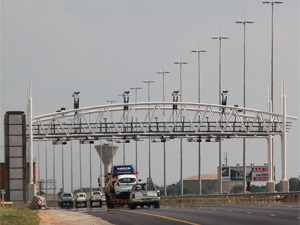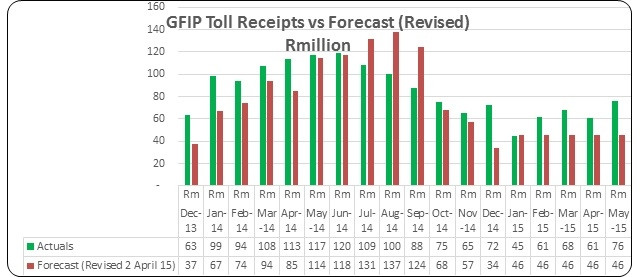
The South African National Roads Agency's (Sanral's) e-toll money woes are deepening as the project cost citizens R7.1 billion more than it should have, while debt on the project has ballooned by R6.8 billion in 12 months.
This is according to the Opposition to Urban Tolling Alliance (Outa), which argues the debt is mounting as fewer people are prepared to pay to drive on the province's roads. Chairman Wayne Duvenage notes more than two million motorists, roughly 80% of Gauteng's freeway users, are not paying for e-tolls.
According to official Sanral figures, the total debt around the project has grown by R6.8 billion year-on-year.
Duvenage, responding to deputy president Cyril Ramaphosa's Wednesday comments that e-tolling revenue is picking up, says "there's a lot of questions" around Sanral's revenue streams and e-toll funding.
According to the official government news site, Ramaphosa said: "The revenue that has been received just in the past month has started picking up and we are certain that rather than a total rejection of this system, we are beginning to see people having a deeper and better understanding of what the government has decided on."
Gauteng's electronic highways, which were funded through R20 billion-worth of bonds, went live on 3 December 2013 after Outa's various legal challenges failed to halt the system. Subsequently, amid public outrage, Gauteng premier David Makhura convened a panel to investigate the socio-economical impact of open-road tolling.
This led to a new dispensation, which is set to be implemented once legislation has been amended. Under the new regime, all motorists are charged a flat rate of 30c a kilometre, down from 40c, and those who have not paid their bills will get a 60% discount. However, continued failure to settle e-toll accounts will mean motorists will not be able to receive a licence disc when they renew vehicle licences.
Commentators have already argued this system will not work because of the amount of legal and technical integration involved.
Meeting obligations
Duvenage says Sanral's e-toll debt is set to continue to mount as it needs to collect R260 million a month to fulfil its commitments, but it is only bringing in an estimated R60 million to R70 million. In January, the agency said non-payment of tolls had a negative impact on the debt levels of its tolled portfolio, which comprises 15% of the roads under its management.

Sanral spokesman Vusi Mona says the e-tolling shortfall will be about R390 million a year, but this will be funded in cash through National Treasury. He notes, at the end of May, motorists paid over R80 million against Sanral's forecast of being able to recoup half that amount.
Mona adds, as of the end of March, total unaudited borrowings - bonds and loans - for the project totalled R46.4 billion, which has grown from R39.6 billion a year ago. He says the agency is meeting its twice yearly coupon payments, and no interest is outstanding.
Money confusion
However, Duvenage says there is a lack of clarity around how much is owed on e-tolling because Ramaphosa admitted in Parliament that Sanral was R20 billion in the red. He points out the company had R20 billion in bonds before a February 2012 injection of R5.8 billion from National Treasury. At the time, then finance minister Pravin Gordhan said: "This will reduce the debt to be repaid through the toll system, and will make a steeper discount possible for regular road users."
"There is a lack of clarity around the accounting" between Sanral's different business units - traditional national roads, toll concession roads and the Gauteng project, says Duvenage. He adds an independent engineer appointed by Outa to conservatively cost the entire Gauteng Freeway Improvement Project (GFIP) shows the upgrade cost society R7.1 billion more than it should have.
Duvenage notes Sanral has not taken any steps to recover money that was overspent as the result of collusion by construction companies, which would have gone some way towards alleviating the e-toll burden. He says Gauteng motorists will not pay for Sanral's inflated debt.
E-tolling will be about R5 billion in the red by this December, predicts Duvenage. In the first four months of the controversial e-highway system going live, the roads agency effectively wrote off R1.123 billion because the overdue amount was not recognised as the agency did not anticipate being able to collect it.
Share